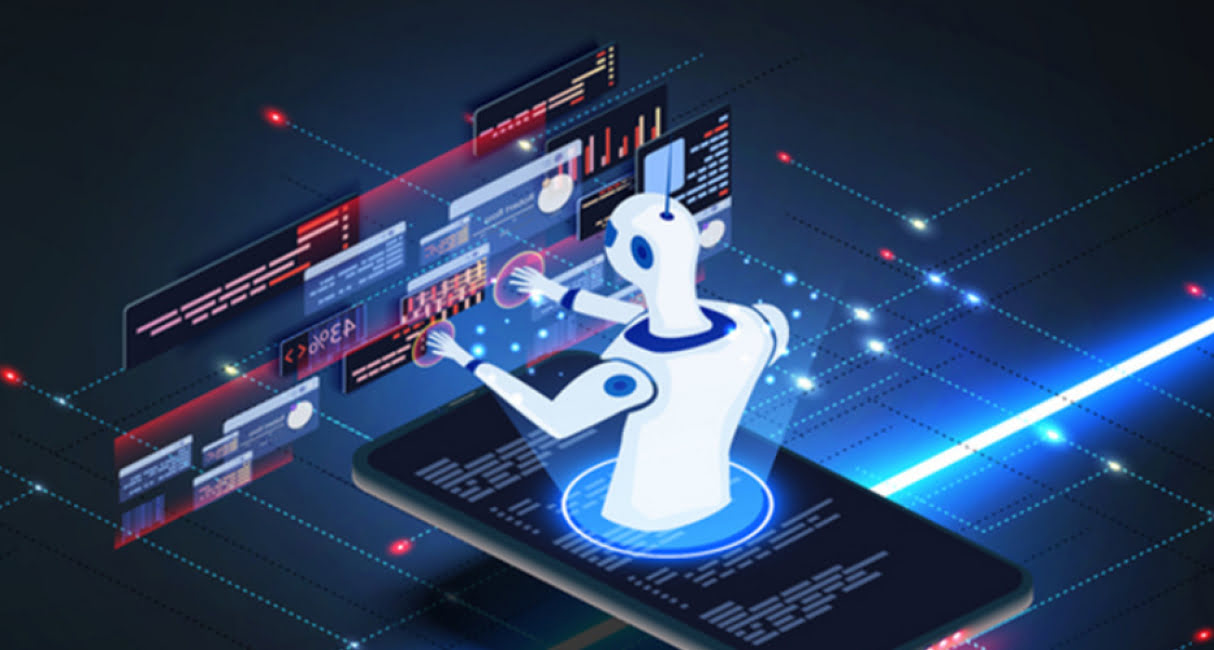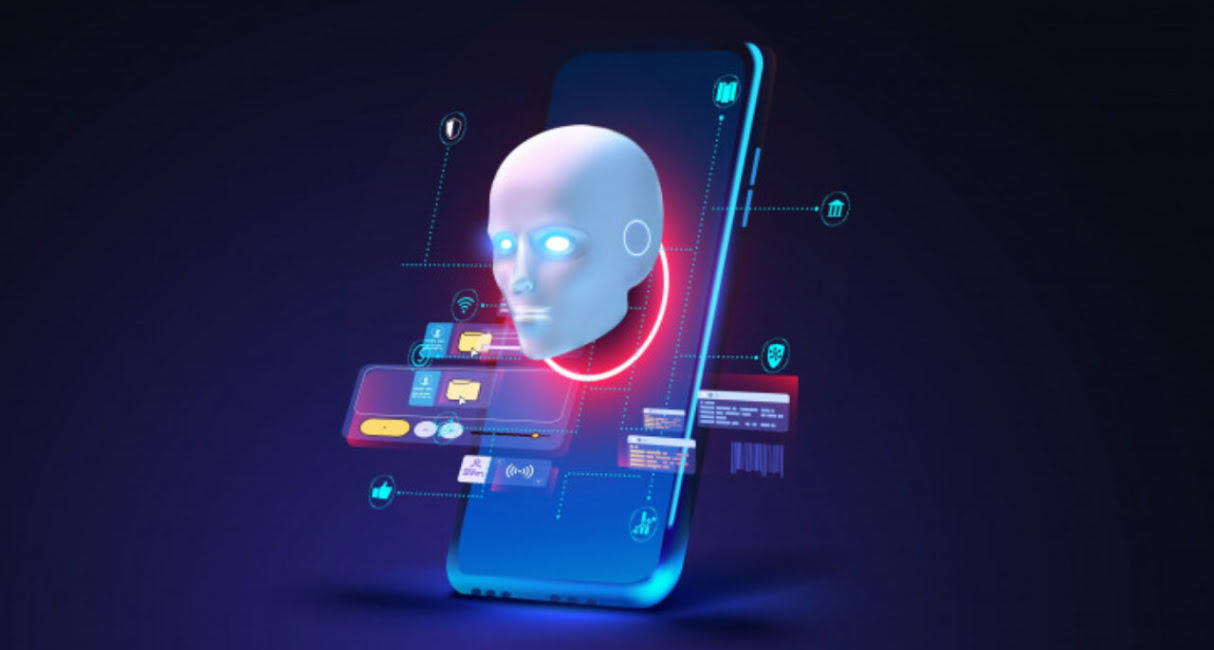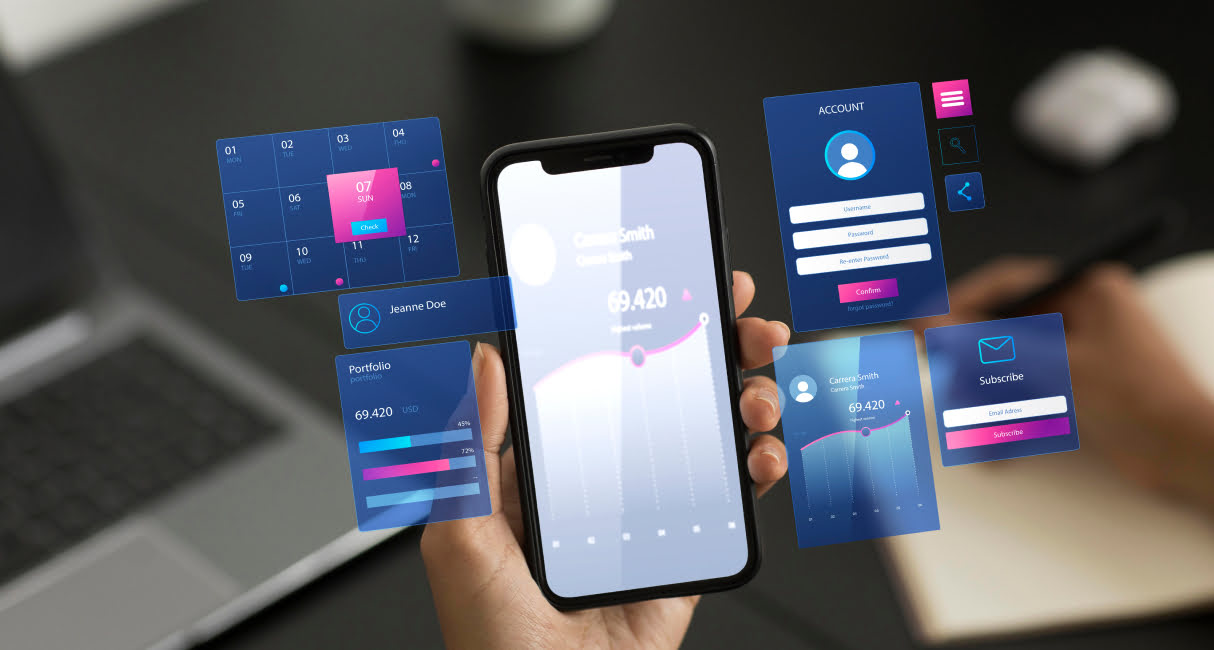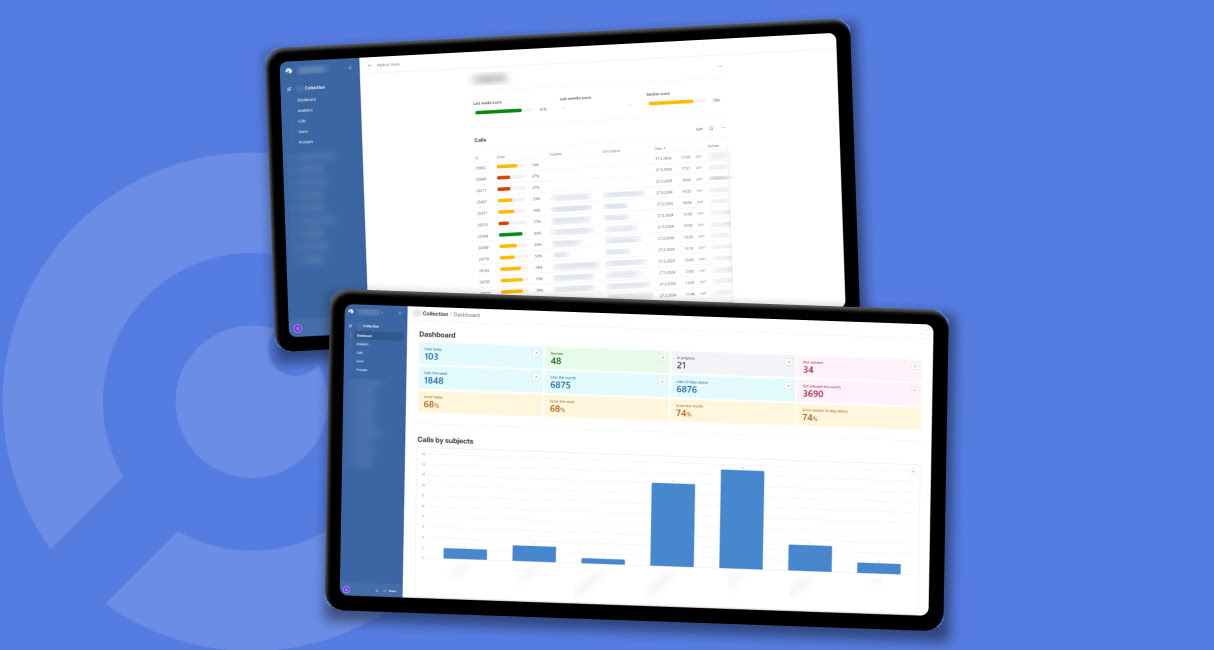Artificial intelligence is transforming how mobile apps are created, launched, and scaled. Companies no longer view it as an optional upgrade — it’s a core driver of efficiency and innovation. Businesses that use AI to develop an app gain a real competitive advantage by making their products smarter, faster, and more adaptable to user needs. In a mobile-first world, artificial intelligence defines how brands make decisions and connect with customers based on real-time data rather than intuition.
No time to read the whole article? Here’s the presentation with all the important points from the article.
Why Businesses Should Use AI in App Development
Artificial intelligence has become a foundation for growth and differentiation in the mobile sector. Global adoption confirms this. According to McKinsey’s 2024 global survey, around 72% of organizations already use artificial intelligence in at least one business function, and 65% report adopting generative tools. Among those users, most saw measurable cost reductions, especially in operations and HR. These numbers show that integrating new tech isn’t a risk — it’s an investment in scalability and operational efficiency.

Key reasons for businesses to adopt it:
- Strategic advantage and efficiency. For decision-makers, integrating AI in application development means achieving more with fewer resources. It automates analytics, personalization, and repetitive workflows, cutting acquisition costs while improving user retention.
- Better customer engagement. Surveys show that over half of users regularly interact with smart features (often without realizing it) through voice assistants, smart search, and recommendation systems. Apps that lack such intelligent interaction quickly feel outdated. Adding intelligent search, chat, or prediction tools keeps the experience relevant.
- Actionability. Mobile apps collect vast user data every day. Artificial intelligence transforms that data into patterns, predictions, and strategies — helping businesses react to market changes instantly instead of relying on slow, manual analysis.
- Competitive sustainability. Artificial intelligence adoption ensures long-term adaptability. As industries evolve, organizations that use data intelligently gain faster response cycles, better accuracy, and stronger user trust — all crucial for leadership in digital markets.
Expert Opinion «The reason companies should use AI in app development is simple — it saves time, reduces costs, and opens new competitive pathways. Those that start integrating AI today will be the ones leading the mobile economy tomorrow.»Oleksandr Prokopiev CEO at Artjoker
Looking for expert assistance?
Artjoker is ready to support you every step of the way!
Benefits of AI for Application Development
The benefits are visible across industries — from retail and finance to healthcare and logistics. Artificial intelligence brings measurable gains in personalization, automation, and decision-making, helping apps serve users better and businesses operate more efficiently.
1. Personalization that drives loyalty
Smart tools study user behavior to deliver tailored content and product suggestions. A retail app can match items to past purchases; a fitness app adjusts workouts automatically. Personalized experiences build stronger loyalty and higher conversions.
2. Smarter automation
Chatbots and voice assistants handle thousands of interactions simultaneously, reducing support workload and improving response time. Some studies, like Forrester’s TEI for IBM Watson Assistant, estimate up to 40% containment in automated requests. Companies maintain quality service around the clock without expanding teams.
3. Predictive insights and analytics
Machine learning anticipates churn, demand, or delays. Leaders act before issues arise, while analytics reveal untapped opportunities hidden in user data.

4. Enhanced security and fraud prevention.
Artificial intelligence detects abnormal activity faster than manual systems. In fintech apps, it stops fraud in real time, strengthening user trust and protecting revenue.
5. Accessibility and inclusion
Smart voice and image recognition can significantly improve accessibility, enabling navigation, translation, and interaction by voice or gesture. However, full compliance still depends on meeting standards like WCAG 2.2 through proper app design.
Ultimately, the benefits of AI for application development go beyond efficiency. They redefine how a business delivers value to users — not through guesswork, but through intelligence built into every interaction.
The Impact of AI on Mobile App Development
The impact of AI on mobile app development is most visible in personalization, automation, analytics, security, and innovation. Artificial intelligence has redefined how companies design and scale mobile products. It now shapes most new app launches across industries, influencing design, analytics, and personalization. Exact figures vary by category, but adoption continues to rise sharply year over year.
AI in mobile application development lets apps predict user needs in real time. A travel app can suggest destinations before users search, while a fintech app adjusts financial advice based on spending patterns. This predictive power turns engagement into anticipation, keeping users active longer.

Artificial intelligence also streamlines development. Tools like GitHub Copilot and Amazon CodeWhisperer assist developers with code generation and debugging. In controlled studies, Copilot users completed coding tasks up to 55% faster, showing clear productivity gains when used in well-structured workflows.
Expert Opinion «Security is also a definitive part of the AI impact on mobile app development. Smart systems instantly detect abnormal logins or suspicious activity, protecting sensitive data and strengthening user confidence in sectors like banking and healthcare.»Oleksandr Prokopiev CEO at Artjoker
Finally, AI enables smarter features such as voice recognition, computer vision, and natural language understanding. Think of AI for Android app development that adds photo tagging or AR navigation — once complex, now accessible through plug-and-play APIs. Intelligence is no longer an extra; it’s the foundation of every competitive mobile app.
How to Effectively Use AI in App Development
Integrating intelligent systems into a mobile project requires planning, the right tools, and a clear focus on business outcomes. Below are the steps and principles that help companies successfully use AI in mobile app development without unnecessary complexity.
Choosing AI Tools and Platforms
Selecting the right toolkit is the first strategic step. For executives, the goal is simple — find the balance between scalability, performance, and privacy, especially in mobile app development, where every millisecond and megabyte matter.
Checklist for choosing your foundation:
- Define your goals. Decide what artificial intelligence should accomplish — speech recognition, image analysis, or predictive analytics.
- Pick your infrastructure. Cloud platforms like AWS, Google Cloud, or Azure suit large-scale data and complex processing.
- Assess on-device options. Frameworks like TensorFlow Lite and Apple’s Core ML are optimized for on-device inference — ideal for offline use and privacy-sensitive data.
- Consider a hybrid setup. Let the cloud handle training and heavy computation while mobile models deliver instant results.
- Prioritize compliance and security. Ensure your stack complies with key data protection laws, such as the GDPR in Europe and the CCPA/CPRA in the United States, covering data minimization, transparency, and users’ opt-out rights.
At Artjoker, we’re committed to providing the assistance you need to succeed!
Contact UsBest Practices for Integrating AI into Mobile Apps
Applying lessons learned from AI in software development, businesses can streamline app creation, improve efficiency, and ensure consistent performance. These practices help teams integrate artificial intelligence into mobile environments effectively while staying focused on real user value.
- Start small, scale wisely. Launch one feature, such as predictive search or automated support, and expand only after it proves value. This minimizes risk and lets teams learn from user feedback.
- Focus on user value, not technology. Every feature should improve experience or business outcomes, not just showcase innovation.
- Ensure transparency and data protection. Communicate how data is used, anonymize sensitive inputs, and comply with privacy laws.
- Collaborate with specialists. Experienced developers can help select the right algorithms, train models, and integrate them without performance trade-offs.
- Iterate continuously. Artificial intelligence must evolve. Use analytics to refine predictions, retrain data sets, and monitor bias or drift.
- Optimize for mobile constraints. Reduce model size and battery usage. Use hardware acceleration — most modern smartphones include dedicated NPUs, such as Apple’s Neural Engine or Snapdragon’s Hexagon NPU, which boost performance while lowering power consumption.
Artjoker’s Cases of AI in Mobile Apps
Real success stories show how artificial intelligence turns digital products into measurable business results. Artjoker applies AI application development services across mobile apps, software, and web platforms, helping clients automate workflows, personalize user experiences, and scale faster. The following cases highlight how our approach converts innovation into tangible growth.

Case Study 1: Fintech Automation with AI Chat and Voice Bots
Problem
Fintech platform MyCredit needed to scale customer support as it grew to nearly one million users. Agents were overloaded with repetitive inquiries, and quality control covered only a small fraction of conversations.
Solution
Artjoker deployed a chatbot across web and messaging apps, a voice assistant for reminders, and a quality assurance module to evaluate every customer interaction. These tools used natural language understanding and automated speech recognition to handle requests and monitor compliance.

Result
The artificial intelligence suite now manages over 100,000 customer requests per month, ensuring 24/7 service without extra staff. Automated QA reviews nearly 100% of customer interactions, while voice and chat bots handle repetitive tasks. Operational costs decreased noticeably, and service speed and customer satisfaction improved significantly.
Case Study 2: AI-Powered Call Center Quality Assurance
Problem
A major call center in Mexico handled thousands of calls daily, but could manually review only 2% of them. Supervisors struggled to maintain service quality, detect issues, and measure performance. Manual auditing was slow, costly, and inconsistent.
Solution
Artjoker built a cloud-based platform that transcribed, analyzed, and scored calls automatically using speech recognition and natural language processing. The system assessed tone, compliance, and customer satisfaction in real time. Elastic infrastructure powered by AWS and Kubernetes ensured scalability.

Result
Call reviews became 10x faster, providing 100% real-time visibility instead of limited manual sampling. Quality assessments achieved over 95% consistency, and infrastructure costs dropped by up to 40% thanks to smart resource allocation.
Case Study 3: AI Recommendations for E-commerce Growth
Problem
Latvia’s largest pharmacy chain, Mēness Aptieka, faced low conversion rates in online cosmetics sales. Users couldn’t find relevant products, and the outdated search engine produced irrelevant results.
Solution
Artjoker redesigned the user experience and added smart personalization. An intelligent skincare recommender guided users through short questionnaires and used a machine learning model to suggest tailored cosmetics. Enhanced Elasticsearch search logic improved relevance, speed, and typo tolerance.

Result
The new system reduced the bounce rate by over 30% and boosted conversions in the cosmetics category. The smart search engine increased engagement time and reduced “no results” queries.
Expert Opinion «These projects show measurable progress. From automation and personalization to smarter analytics, our clients see how the right artificial intelligence strategy turns products into real business growth.»Oleksandr Prokopiev CEO at Artjoker
Conclusion
Using AI for mobile app development, companies accelerate growth, reduce manual effort, and deliver exceptional user experiences. Whether it’s automation, personalization, or predictive analytics — the potential is real and measurable.
Artjoker’s team of AI app developers brings hands-on expertise in strategy, design, and engineering. If you’re ready to explore how artificial intelligence can enhance your product, request a free consultation. We’ll analyze your current challenges and identify solutions that deliver clear business results.
By combining deep expertise in artificial intelligence with practical business insight, Artjoker helps companies move from experimentation to execution, building intelligent apps that lead markets, not follow them.
Similar articles
View allyour business
together
- PROJECT INQUIRIES info@artjoker.net
- CALL US +1 213 423 05 84
contact us:












